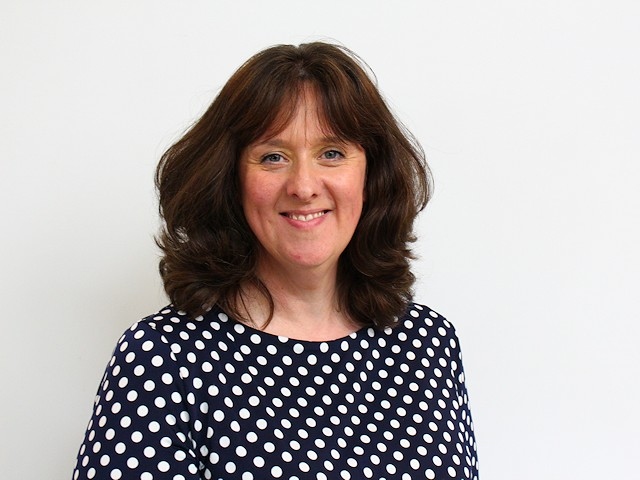Rochdale’s director of public health expects cases will ‘continue to rise’ after Delta surge but no Covid deaths in borough for three weeks
Date published: 07 June 2021

Andrea Fallon, Director of Public Health
Rochdale’s director of public health says she ‘remains concerned’ about the spread of Covid-19 in the borough, and expects cases will continue to rise as the ‘Delta’ variant takes hold.
Data shows that Rochdale saw a total of 274 cases in the week to 2 June – 104 more than the previous week. A rise of 61%, the infection rate now stands at 123 cases per 100,000 people.
The so-called ‘Indian’ or Delta variant is now dominant in the borough and accounts for around 80% of all new cases.
The strain is understood to be around 40% more transmissible than the ‘Alpha’ variant which led to the post-Christmas lockdown. There are also concerns vaccines may be less effective against it – particularly in people who have not had a second dose.
Encouragingly, though, that does not seem to have translated into an increase in hospitalisations or deaths. With 128,000 people jabbed – and more than half having both doses – it suggests the vaccines are doing their job.
Read more: 81,846 people in the borough have now had a second Covid-19 vaccinationPublished: 04 June 2021
However, Rochdale’s public health director Andrea Fallon says there is still some way to go to bring the virus under control.
She said: “We remain concerned until the pandemic is over as residents that have not been vaccinated are at risk of serious illness from the virus.
“However, we are in a very strong position now when compared to last year. Whilst the number of cases has risen recently, this is against a backdrop of a lot of testing finding most of the cases and a substantial proportion of the population having had a vaccine.
“Our numbers in hospital have continued to fall and for the last three weeks we have not had a death from Covid-19 registered.”
And she predicts that the Rochdale infection rate will keep going up in the short term.
“Given the picture that we have seen in other boroughs, we can expect our cases to continue to rise over the coming weeks and so it is more crucial than ever that we continue to test regularly and people have their first and second doses of the vaccine as soon as it is offered to them. “
A recent update from council chief executive Steve Rumbelow said that the majority of the recent increase in cases is among the Asian/Asian British population.
Ms Fallon says that the same factors that led to a disproportionate impact on the BAME community in the first lockdown – such as high-density housing – still apply.
“Once a new variant has become endemic in the population you then expect a similar clustering pattern to what previously happened,” she said.
“In Rochdale this patterning has shadowed known risk factors such as densely populated overcrowded areas.
“Now older people have been vaccinated, we see the cases occurring much more commonly in the unvaccinated younger population.”
While younger children do not easily pass on the virus to adults, data for earlier variants indicates that older children are able to spread the virus to older adults.
Teenagers and young adults are tested regularly to prevent spread in school.
But they are not vaccinated – and as they mingle a lot this has resulted in them spreading the virus mainly among their peer group.
“It is notable from our age data that infections in older people are currently remaining low,” said Ms Fallon.
“For example, there were only eight cases of coronavirus in residents over 60 during the last seven days. So, clearly, at present, younger people are not causing a large number of hazardous infections to older people.”
Covid ‘hotspots’ tend to pop-up and subside in different parts of the borough – and Ms Fallon puts most of this down to ‘statistical variance’.
But some areas seem to have more stubbornly high rates than others – one example being Wardleworth and Newbold Brow in central Rochdale.
“Over time some places have had more cases but these areas usually have more people with risk factors for infection,” said Ms Fallon.
“An example would be our South Asian population has on average more risk factors because of living in more densely populated areas, often having public facing jobs and living in larger family units.”
She continued: “Now of importance is the age structure. It is inevitable that those areas that have younger populations or more young families will have more cases because of testing in schools and colleges and lower levels of vaccination.
“Rochdale council have reached out to all communities and has had extra measures to help people such as pop-up vaccination and testing centres.”
Advice and guidance on coronavirus can be found here: www.rochdale.gov.uk/coronavirus
Nick Statham, Local Democracy Reporter
Do you have a story for us?
Let us know by emailing news@rochdaleonline.co.uk
All contact will be treated in confidence.
Most Viewed News Stories
To contact the Rochdale Online news desk, email news@rochdaleonline.co.uk or visit our news submission page.
To get the latest news on your desktop or mobile, follow Rochdale Online on Twitter and Facebook.


